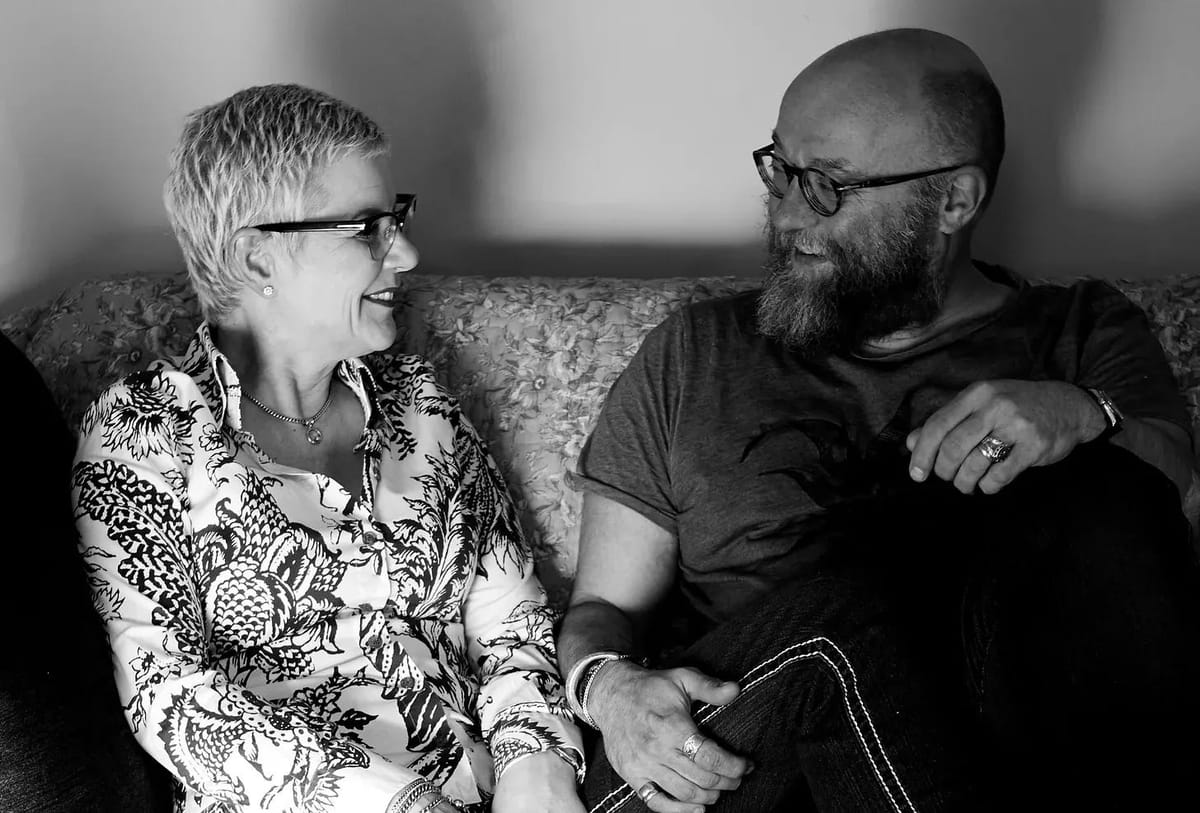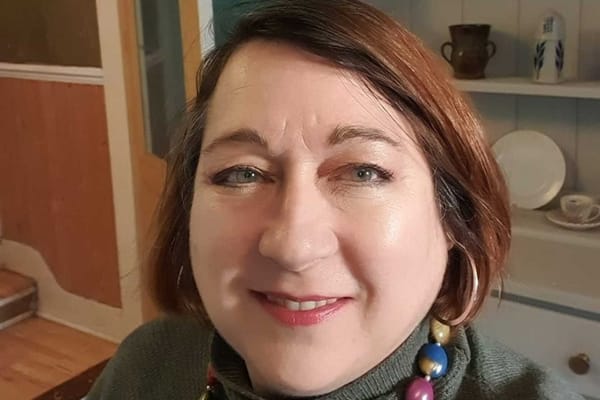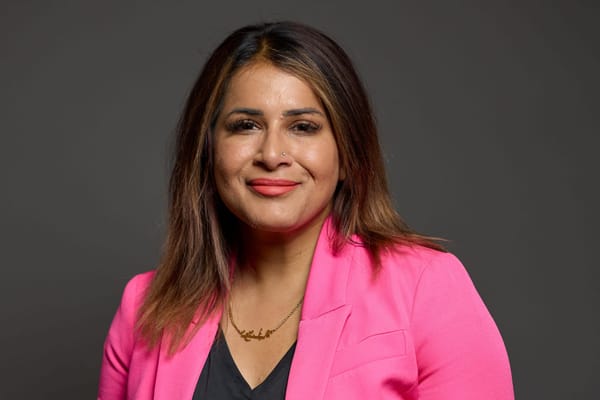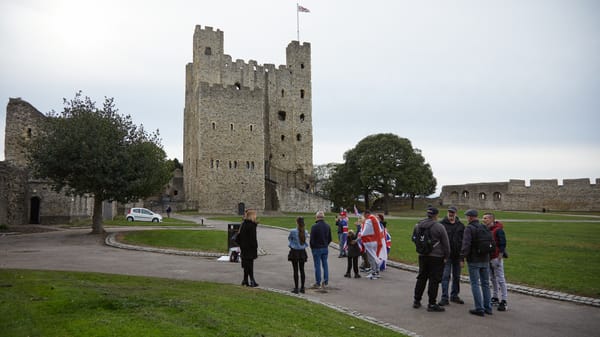“If I'm prolific, it means that people keep coming back for more”
What Steven asked writer Dan Abnett and maker Nik Vincent

In the first of a two-part interview, Steven speaks to husband and wife Dan Abnett and Nik Vincent. Dan is a prolific comic book writer and novelist, while Nik is an author and maker. They speak about how they came to start writing together, Dan’s father, who was a significant member of the Medway folk scene and Steven’s Year 9 art teacher, being physically attacked for something Dan wrote, and lots more.

Please spell your name for the record.
Dan: My name is Dan Abnett, which is D-A-N then A-B-N-E-T-T. You looked at me as if I got that wrong.
Nik: I was trying to think what my name was.
How do you want to be known?
Nik: When I'm potting, I'm Nola Clay, N-O-L-A C-L-A-Y. I write as Nik Vincent, N-I-K-V-I-N-C-E-N-T, if I'm co-writing with Dan Abnett. If I'm writing my own things, I write as Nik Abnett, N-I-K-A-B-N-E-T-T. I'm also Nicola Vincent-Abnett, my whole married name.
What is your official occupation?
Dan: I always describe myself as a writer, which is a good general umbrella for the fact that I am a comic book writer, a novelist, a short story writer, audiobooks, games… Author doesn't quite work when you get to those things. I've written a bit of everything, but primarily novels and comic books.
It would be fair to describe you as prolific.
Dan: Yes, prolific is a word that is used prolifically. Back in the 1970s, Marvel in the US had a habit of giving everybody a little moniker, like Stan ‘The Man’ Lee and ‘Jaunty’ John Buscema and things like that. I've discovered recently that when I am referred to, they'll say, “We now have the prolific…” At first, I thought, ‘That's quite nice.’ Then I went, ‘Oh, it makes it sound as if I write a lot for no good reason.’ But I figured that if I'm prolific, it means that people keep coming back for more.
Nik: I usually refer to myself as a maker. Sometimes I'm a writer, sometimes I'm a potter, I'm a photographer, I knit, I sew, I can do pretty well anything, so I call myself a maker.
Outside of writing, what other creative roles do you have?
Dan: Outside of writing, well… (blows air)
Nik: You're a decent photographer.
Dan: Yeah, I like photography particularly. There's a lot of things that I would do. Although writing is a job, and I take it very seriously as a job, I do it professionally, it doesn't ever stop. In the course of the day, I might spend from seven in the morning through till five at night writing as a job. But that doesn't mean in the evening my mind's not doing things, whether it's reading a book or we’re out taking photographs or whatever else.
Nik: Everything feeds the mind.
Dan: Absolutely everything feeds it. It doesn't switch off really. Sometimes, it goes into a nice neutral. Photography, if I was to say that I had any kind of hobby that I did when I'm not deliberately working, it would be photography. Although I like cooking too.
Nik: He's a polymath. He's a very good and very creative cook. He doesn't need a cookbook. He's a very good musician. He sings. He draws beautifully. All the maps and things in his books start with his sketches.
Dan: Well, thank you for that (laughs).
Nik: There are lots of things. You thought you would end up at art school. There are lots of things that you brought with you through your life. His parents are artists, father was a very famous luthier.
Your father was my art teacher. Was being a writer a small act of rebellion?
Dan: No, it really wasn't. It was a very creative household. I was the only child of only children. My parents were both artists and art teachers. They both taught art, and they were musical. My dad, apart from being an art teacher, was a musical instrument maker and made instruments for many folk groups. They used to be in a folk group. They used to run the Medway Little Theatre Folk Club in the sixties, and the folk revival, this kind of stuff. My dad also liked making model railways. There was no end to his…
Nik: He was a maker.
Dan: I grew up being encouraged to be creative in every regard but particularly drawing and painting. It was something that I did, because my parents did it and that was going to be what I did. I went through most of my school career enjoying school, but thinking, I'm going to art college. That's what I'm going to do. That's exactly what I'm going to do. Up to and including not only drawing. I used to draw and write as a kid. Those were my favourite hobbies apart from reading. At about age eight or nine, I discovered comics, I realised that actually my hobby could be doing both of the things I love most at the same time, which was writing and drawing my own comics, which I did, again without any expectation of that being something I would do professionally. I had a series of really great English teachers, but I had a great English teacher called John Morgan at Maidstone Grammar School. He said to me, “I understand that you want to apply to art college, which is fine. That's your choice, and you're good enough. If you want to do that, you can by all means do that and has it occurred to you that you could also study English at university?” which I had not. He said, “If it's something you think you might want to pursue, I will encourage you and help you.” which he then did. The idea of the written word rather than drawing, I realised that I probably couldn't, from my point of vie,w draw well enough or, more particularly, fast enough, to tell all the stories that I wanted to tell in these comics that I was producing. I could write them, and that really was a switch. It's exactly the same creative impulse. It just shifted over from one form to another.
When you were talking just now about what other creative roles you would like to do. In the course of an average week, there are probably times that I wish I had where I could paint or draw or whatever, do other creative things like that. I tend not to, they're dormant because I'm...
Nik: Because you're prolific.
Dan: (laughs) Because I'm prolific.
Nik: Your full-time job is more than full-time.
Would you consider now doing a personal comic project that you wrote and drew?
Dan: Gosh.
Nik: All his projects are personal.
Dan: Yeah.
Nik: He just has other people working with him.
Dan: I think it comes back to that idea of not being able to draw faster. I think particularly once I've been a professional comic writer for about ten years when I decided to also write novels, which is the other thing I wanted to do, and I did the work that was coming to me, and that became this tandem career. Novels take you even further away from the art for obvious reasons.
Nik: But when you're working, from the outside, in comics you work in two ways. You either are writing scripts for an artist, and that's what you do, or you're collaborating with an artist as you do with Ian Culbard. You spend hours talking back and forth, and it's very collaborative, and you don't draw as well as he does.
Dan: That's exactly it. Knowing what I'm able to produce as part of a team, I think it would take me probably years now to refine any kind of skill that I would be remotely happy with.
Nik: And you’d be on your own all the time again.
Dan: It's got to the point now with various different artists on different strips that I've worked with for a long time, I know that what is produced is far superior than anything I could possibly do myself.
Nik: When you're working with the Ian Culbards of this world, when you're working with the Phil Winslades, that's an absolute privilege. They're your brothers. You don't have relatives.
Dan: (laughs) That’s true.
Nik: You have really long-standing relationships with these amazing men.
Dan: I do think about what it's going to look like. I imagine how it’s going to look, so I make suggestions about the way it will be laid out. The script will actually describe points of view and whether it's a wide shot and this kind of stuff, because I'm visualising it cinematically. Sometimes, I am even sketching this out if I don't think the script is clear enough. I get a little way towards that, but always the artist has veto. The artist goes, “That's fine, but what about this?” And you go, “Oh, that's why you're the artist.”
You mentioned yourself as a maker. Is there a primary focus for yourself?
Nik: That depends what day of the week or week of the month. At the moment, I'm stitching up a blanket and making myself some summer dresses. Knitting and sewing at the moment. I did, as you know, a big pottery project last year, which took me a year and a half. I've just got back in the studio again. I've been out of the studio for ten or twelve weeks.
Dan: But that was a very intensive thing. I would say that for years, you would do whatever was interesting. Sewing, knitting, writing, but when you started to do pottery that really became a singular thing. It's like pottery…
Nik: And then everything else.
Dan: Particularly when, because pottery is quite physically hard work. When you need a rest.
Nik: Because I have some physical problems.
Dan: When sitting on a sofa and knitting or whatever is good, it is a way of making and being creative. Plus, great blankets.
Nik: Beautiful blankets. I can't not be doing something. I do have to be quite idle, at least some of the time, because of my physical problems. I have to be sitting down for a couple of weeks, then hand sewing or knitting keeps me up. I'll sketch ideas for things to do later. But pottery is the one thing I couldn't do without.
Dan: The other thing that is important in terms of creativity between the two of us, is we talk a lot. We will talk about all sorts of ideas which will generate ideas, often in me, but sometimes in you. But more particularly, I will constantly say, “What do you think of this idea? I'm stuck on this.” Sounding board, brainstorming. Nik's also my first reader. Before I send anything anywhere, you read it first and tell me how terrible it is. All my novels go through that as well. There is that collaboration. You know what I'm working on.
Nik: How many novels have I written? Ten, twelve. I've written as many novels as most full-time writers my age. They've come out in different formats and not necessarily always with my name on, and I'm unpublished, three or four novels. I have quite a broad experience as a writer. I'm not as good a writer insofar as I'm a very obsessive writer, and when I'm writin,g I can't do anything else, and that includes getting dressed, cooking supper, doing the washing. I have to get rid of a writing project really quickly. That can be a day or two for a short story. I've written in novel in… Do I admit this?
Dan: That's up to you.
Nik: 17 days (laughs).
Dan: That's the way you do it. You are in novel mode, occasionally pausing for sleep, and everything else stops, whereas I'm doing that professionally. I'm going, ‘Okay the next three months is this novel, I will work on it, I'll stop. That's the end of today. I'll stop and go and cook.’
Nik: It's a very different process.
Dan: I don't think any two creatives or writers work in the same way.
Nik: It never takes me more than six weeks to write a book.
Dan: You don't really think of yourself primarily as a writer, yet you've written as many novels as a writer your age. I've the same as seven or eight. Prolific.




